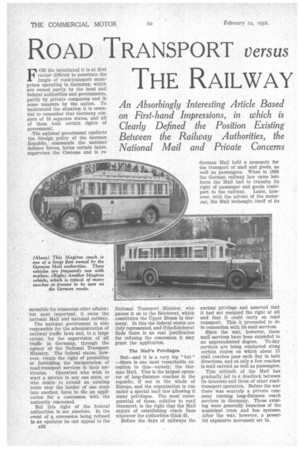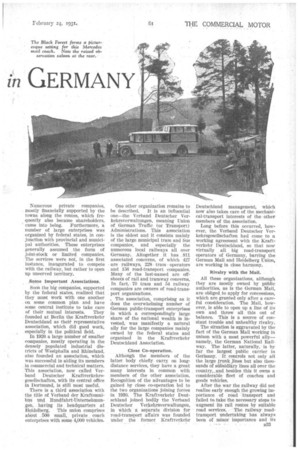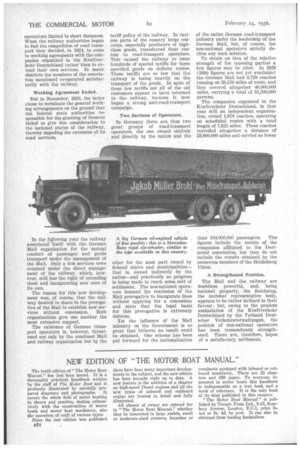ROAD TRANSPORT versus
Page 66

Page 67

Page 68

If you've noticed an error in this article please click here to report it so we can fix it.
THE RAILWAY GERMANY
An Absorbingly Interesting Article Based on First-hand Impressions, in which is Clearly Defined the Position Existing Between the Railway Authorities, the National Mail and Private Concerns
FOR the uninitiated it is at first rather difficult to penetrate the jungle of road-transport enterprises operating in Germany, which are owned partly by the local and federal authorities and governments, partly by private companies and in some measure by the nation. To understand the situation it is essential to remember that Germany consists of 16 separate states, and all of them hold certain rights of government.
The national government conducts the foreign policy of the German Republic, commands the national defence forces, levies certain taxes, supervises the Customs and is re sponsible for numerous other affairs: but most important, it owns the national Mail and national railway.
The national government is also responsible for the administration of national traffic laws and, to a large extent, for the supervision of all traffic in Germany, through the agency of the National Transport Ministry. The federal states, however, retain the right of permitting or forbidding the inauguration of road-transport services in their ter ritories. Operators who wish to start a service in any one state, or who desire to extend an existing route over the border of one state into another, have to file an application for a concession with the authority concerned.
But this right of the federal authorities is not absolute. In the event of a concession being refused to an operator he can appeal to the c16
National Transport ,,Minister, who passes it on to the Reichsrat, which constitutes the Upper House in Germany. In this the federal states are duly represented, and if theReichsrat finds there is no real justification for refusing the concession it may grant the application.
The Mail's Privileges.
But—and it is a very big " but " —there is one most remarkable exception to this—namely, the German Mail. This is the largest operator of long-distance coaches in the republic, if not in the whole of Europe, and the organization is run under a special mail law allowing it many privileges. The most consequential of these, relative to road transport, is the right that the Mail enjoys of establishing coach lines wherever the authorities think fit.
Before the clays of railways the German Mail held a monopoly for the transport of mail and goods, as well as passengers. When in 1838 the German railway law came into force the Mail had to transfer its right of passenger and goods transport to the railway. Later, however, with the advent of the motorcar, the Mail bethought itself of its ancient privilege and asserted that it had not resigned the right at all and that it could carry on road transport. This it proceeded to do in connection with its mail services.
Since the war, however, these mail services have been extended to an unprecedented degree. To-day services are being conducted along certain routes on which about 15 mail coaches pass each day in both directions, and on only a few coaches is mail carried as well as passengers.
This attitude of the Mail has gradually led to a deadlock between its interests and those of other roadtransport operators. Before the war there was scarcely a private company running long-distance coach services in Germany. Those existing were generally branches of the municipal tram and bus systems. After the war, however, a powerful expansive movement set in. Numerous private companies, mostly financially supported by the towns along the routes, which frequently also became shareholders, came into being. Furthermore, a number of large enterprises was organized by federal states, in conjunction with provincial and municipal authorities. These enterprises generally assumed the form of joint-stock or limited companies. The services were not, in the first instance, inaugurated to compete with the railway, but rather to open up unserved territory.
Some Important Associations.
Soon the big companies, supported by the federal states, realized that they must work with one another on some common plan and have some central institute to take care • of their mutual interests. They founded at Berlin the Kraftverkehr Deutschland as their representative association, which did good work, especially in the political field.
In 1926 a large number of smaller companies, mostly operating in the densely populated industrial districts of Westphalia and Rhineland, also founded an association, which was successful in aiding its members in commercial and technical matters. This association, now called Verband Deutscher Kraftverkehrsgesellschaf ten, with its central office in Dortmund, is still most useful.
• There is a third association with the title of Verband der Kraftomnibus und Itundfahrt-Unternehmungen, having its headquarters at Heidelberg. This union comprises about 500 small, private. coach enterprises with some 4,000 vehicles. One other organization remains to be described. It is an influential one—the Verband •Deutscher Verkehrsverwaltungen, meaning Union of German Traffic (or Transport) Administrations. This association is the oldest and it consists mainly of the large municipal tram and bus companies, and especially the numerous local railways all over Germany. Altogether it has .811 associated concerns, of which 427 are railway* 228 tram operators and 136 road-transport companies. Many of the last-named are offshoots of rail and tramway concerns. In fact, 70 tram and 54 railway companies are owners of road-transport organizations.
. The association, comprising as it does the overwhelming number of German public-transport enterprises in which a correspondingly large share of the national wealth is invested, was manifestly a natural ally for the large companies mainly owned by the federal states and organized in the Kraftverkehr Deutschland Association.
Close Co-operation.
Although the members of the latter body chiefly carry on longdistance services, they have a great many interests in common with members of the other association. Recognition of the advantages to be gained by close co-operation led to the two organizations joining forces in 1930. The Kraftverkehr Deutschland joined bodily the Verband Deutscher Verkehrsverwaltungen, in which a separate division for road-transport affairs was founded under the former Kraftverkehr Deutschland management, which now also takes care of the mechanical-transport interests of theother members of the association.
• Long before this occurred, however, the Verband Deutscher Verkehrsgesellschaften had come to a working agreement with the Kraftverkehr Deutschland, so that now virtually all big road-transport operators of Germany, barring the German Mail and Heidelberg Union, are working in close harmony.
Rivalry with the Mail.
All these organizations, although they are mostly owned by public authorities, as is the German Mail, are obliged to. apply for concessions, which are granted only after a careful consideration. The Mail, however, is able to open up a line of its own and throw all this out of balance. This is a source of constant trouble and unhealthy rivalry.
The situation is aggravated by the fact of the German 'Mail working in unison with a most powerful ally— namely, the German National Railway. The latter, naturally, -is by far the largest public carrier in Germany. It controls not only all the large punk „lines but also thousands Of subsidiary lines all over the country, .and. besides this it owns a considerable fleet of coaches and goods vehicles.
After the war the railway did not realize early enough the growing impOrtance of road transport and failed to_take the necessary steps to augment its rail routes by suitable road services. The railway roadtransport undertaking has always been of minor importance and its operations limited to short distances. When the railway authorities began to feel the competition of road transport they decided, in 1924, to come to working agreements with the companies organized in the Kraftverkehr Deutschland rather than to extend their own services. In many districts the members of the association mentioned co-operated satisfactorily with the railway.
Working Agreement Ended.
But in November, 1928, the latter chose to terminate the general working arrangements on the ground that the federal state authorities responsible for the granting of licences failed to give due consideration to the national status of the railway, thereby impeding the extension of its road services.
In the fellowing year the railway associated itself with the German Mail organization for the mutual conduct of passenger and goods transport under the management of the Mail. Only a few services were retained under the direct management of the railway, which, however, still has the right of extending them and inaugurating new ones of its own.
The reason for this new development was, of course, that the railway desired to share in the prerogative of the Mail to establish new-services without concession. Both organizations give one another the most extensive support. The existence of German transport operators is, however, threatened not only by the combined Mail and railway organization but by the tariff policy of the railway. In various parts of the country large concerns, especially producers of highclass goods, transferred their custom to road-transport operators. This caused the railway to issue hundreds of special tariffs for these specified goods on definite routes. These tariffs are so low that the railway is losing heavily on the transport of the goods. In spite of these low tariffs not all of the old customers appear to have returned to the railway, because it now began a strong anti-road-transport campaign.
Two Sections of Operators.
In Germany there are thus two great groups of road-transport operators, the one owned entirely and directly by the nation and the other for the most part owned by federal states and municipalities-that is, owned indirectly by the nation—and practically no progress is being made to reach some sort of settlement. The non-national operators demand tile rescission of the Mail prerogative to inaugurate lines without applying for a concession and state that the legal basis for this prerogative is extremely dubious.
Yet the influence of the Mail ministry on the Government is so great that hitherto no result could be obtained. One scheme has been put forward for the nationalization of the entire German road-transport industry under the leadership of the German Mail, but, of course, the non-national operators strictly decline any such solution. To obtain an idea of the relative strength of the opposing parties a few figures may be cited. In 1929 (1930 figures are not yet available) the German Mail had 3,728 coaches running on 26,150 miles of route, and they covered altogether 46,000,000 miles, carrying a total of 81,500,000 persons. The companies organized in the Kraftverkehr Deutschland, in that year still an independent organization, owned 1,678 coaches, operating on scheduled routes with a total length of 7,625 miles. These coaches travelled altogether a distance of 33,600,000 miles and carried no fewer than 104,000,000 passengers. The figures include the results of the companies affiliated to the Dortmund association, but they do not include the results obtained by the numerous members of the Heidelberg Union.
A Strengthened Position.
The Mail and the railway' are doubtless powerful,• and, being national property, the Reichstag, the national representative body, appears to be rather inclined in their favour; but, owing to the prudent assimilation of the Kraftverkehr Deutschland by the Verband Dentscher Verkehrsverwaltungen, the position of non-national operators has been tremendously strengthened. There are, therefore, hopes of a satisfactory settlement.




















































































































